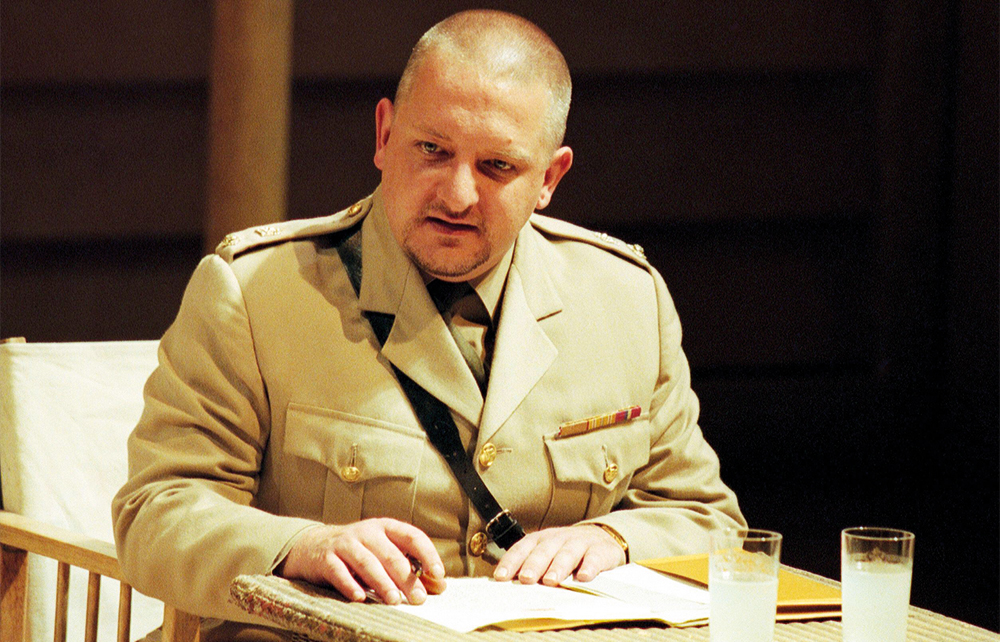The path to National Treasureland is no paved highway. Simon Russell Beale, the finest classical actor of his generation, was nearly lost to academia (he swerved a PhD in Victorian literature), and faced down pigeon-holing from an agent who wanted to change his name to Simon Beagle, the better to capitalise on a knack for dopily jolly comedy roles. Now – and not before time – he’s written an elegant study of Shakespeare that does double duty as a juicy actor’s autobiography.
The pleasure here is in the mix of green room gossip and literary insight. There’s plenty of the former: dining next to Lauren Bacall at the chat show queen Barbara Walters’s place? Good. Watching Top Gun with Imelda Staunton and Penny Downie? Even better. But Beale’s heart is in the text and in particular the great Shakespearean roles, 18 of them (including Iago, Richards II and III, Macbeth, Prospero, Lear and Hamlet), that he’s taken on since his first gig at the RSC in 1985.
Beale sounds a bit bashful about building a book around character criticism (he points out that the fussier kind of academic regards the practice as ‘almost improper’), but he really shouldn’t let such fashions concern him. His dalliance with Victoriana notwithstanding, he’s got the chops to be a scholarly early modernist, and he structures the book like a performer’s Plutarch, a collection of parallel lives that produces some unexpected juxtapositions: Macbeth and Benedick in a chapter on ‘Love and Marriage’; Prospero and Richard II as ‘Two Autocrats’. Julius Caesar’s Cassius and Twelfth Night’s Malvolio are rarely considered together, but an actor who has played them both within a space of a few years can see the linking threads. In two highly regarded performances, Beale interpreted both as victims of class anxiety, scholarship boys in a world of unthinkingly privileged toffs.
A Piece of Work makes the most of what Emma Smith calls Shakespeare’s ‘gappiness’ – his propensity to avoid the tidy answer or the neat conclusion. Where scholars might rush in to fill the void, Beale (writer) is happy to accept the authority of Beale (actor) that – for instance – ‘we will never know for certain’ what mysterious events prompt the change in Hamlet between Acts IV and V, from frenetic Polonius-slayer to the closed off figure whose death ends the play.
If there’s acuteness in these readings, Beale’s courtesy in only analysing the characters he himself has played (and therefore thought lots about) leads to some gaps. We see the great sadist Iago afresh when we’re told that he’s ‘dull company… a pub bore’, but it’s a little odd to learn nothing about the performer who played opposite him as Othello in 1997. It was David Harewood, now president of Rada and at the time the first black actor to take the role at the National Theatre (in, I repeat, 1997).
But actors are rightly scrupulous about not giving notes to fellow cast members, and Beale extends this credo to his book. There are other principles at work in these pages, too. He seldom takes received readings as established facts (Falstaff’s legendary charm and Iago’s ‘motiveless malignity’ come in for scrutiny) and relishes the frequently wide distance between textual meanings that live in popular sense memory and the interpretations that become apparent when a speech is studied in context. Prospero’s ‘Our revels now are ended’ might serve as a gorgeous send-off at a funeral (John Gielgud got heartily sick of being asked to recite it), but it really doesn’t mean what it has been taken to mean. No plangent farewell, this is Prospero’s brusque explanation to his new son-in-law Ferdinand that the party’s over. In short, ‘the worst father-of-the-bride speech ever made’. As Beale diplomatically puts it: ‘The narcotic beauty of Shakespeare’s language can disguise what is actually being said.’ Indeed: and often we’re just not paying enough attention.
It’s sometimes observed that a mighty intellect holds an actor back, which is obviously nonsense. Beale wields his to bear with what he calls the ‘theatrical uncertainty principle’ – ‘a character can think or feel several contradictory things at the same time’ – and to weather the slings and arrows of life. Behind his career on stage is a peripatetic childhood as the son of an army doctor, and the terrible loss of his infant sister Lucy. There’s uncertainty there, too, and grief – compounded when his mother dies shortly before the opening night of Hamlet. Other performers have been derailed by such coinciding of life and art. Beale holds it an ‘honour’ to play the part ‘when it has the greatest personal significance’, and places a photo of his mum on the props table so she’s there whenever he comes off stage.
Fortitude, emotional intelligence and wit characterise Beale’s performances, and the qualities are on display in A Piece of Work. He has a memoirist’s sensitivity to evocative detail (tomato sandwiches with lemon and sugar, or delicious between-show naps in the old Royal Shakespeare Theatre dressing rooms with the French windows open to the sounds of the Avon) and the literary critic’s sharp passion for language. The combination is captivating: a wise, feeling book about a life lived alongside Shakespeare.






Comments